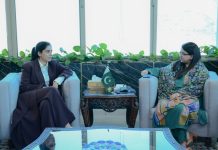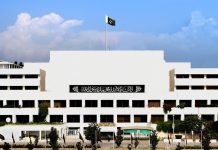By Asad Cheema
ISLAMABAD: The Pakistan Readymade Garments Manufacturers and Exporters Association (PRGMEA) on Thursday felicitated newly-elected Prime Minister Shehbaz Sharif and Commerce & Textile Minister Naveed Qamar, suggesting the new government to initiate lobbying for continuity of GSP Plus, besides implementing new Textile and Apparel Policy in its true spirit through revival of Pakistan Export Promotion Board.
PRGMEA Chief Coordinator Ijaz Khokhar and regional chairman Sheikh Luqman Amin observed that the largest value-added textile exporters’ body, representing the majority of SMEs in the country, welcomes the new PM and appreciates his selection of Naveed Qamar to assign him the vital ministry of Commerce & Textile.
Sheikh Luqman Amin observed that Naveed Qamar’s appointment would help boost country’s exports, especially of the value-added textile, while all the macro and micro issues of the trade and commerce would be addressed. Ijaz Khokhar suggested the new government to initiate work on lobbying for the renewal of Generalized Scheme of Preferences (GSP) plus status for Pakistan from the European Union well before time to sustain exports growth, as the end of duty-free facility would damage the exports growth volume by at least $3 billion annually.
He made an appeal to the Prime Minister Shehbaz Sharif and Commerce Minister Naveed Qamar to get personally involved in this issue of national importance, giving directives to all stakeholders, including foreign, finance, commerce and industries ministries at federal level while environment, human rights, women development and labour departments at provincial level, besides taking the value-added apparel sector exporters onboard to devise a strategy to influence the EU countries for renewal of the GSP Plus status for Pakistan.
“Though the present status will expire in Dec 2023, but Pakistan can face its destructive effects from next year because the international buyers will start searching for other regional suppliers for placing new orders, leading to export loss of around $3 billion for Pakistan,” he warned.
Ijaz Khokhar observed that extension in the European Union’s status has
played a great role in enhancing Pakistan’s exports. With a view to sustain
the employment opportunities in the country as well as boosting foreign
exchange reserves further the government will have to act immediately to
push the EU countries for extension of GSP Plus facility to Pakistan for
another 10 years, from Jan 2024 to Dec 2033.
Interaction and communication with ambassadors of the EU bloc and other
European countries should have to be initiated in this regard, he said,
underlining the need for direct advocacy and lobbying through visits to the
EU headquarters in Brussels.
PRGMEA Regional Chairman stressed that the government should use its
diplomatic relations to win extension in the GSP Plus status, as it is
impossible for Pakistan to compete the regional countries especially
Bangladesh, India and Vietnam, as the earlier countries’ cost of production
is comparatively low while the latter has preferential trade agreement with
the EU.
Regarding Textile & Apparel Policy 2020-25, Ijaz Khokhar added that the
apparel policy has already approved in 2022 after a long time which now
needs implementation in its true spirit, as we have already lost one year.
“By taking all the stakeholders onboard and ideally the quarterly
implementation review must be carried on with the Prime Minister himself in
the chair,” he demanded.
He also called for the revival of Pakistan Export Promotion Board for the
speedy implementation of this Policy, requesting the Prime Minister to chair
the meetings of PEPB to increase Pakistan’s export competitiveness. “We
expect that the PM is energetic and efficient to take quick and positive
decision and we are confident that this board would work efficiently and on
regular basis,” the Chief Coordinator said.
Sheikh Luqman Amin expressed the hope that the $42 billion export target
fixed for the next five-year Textile Policy will be achieved, as the timely
implementation of the long-term policies would not only bring new
investments in the country but would also enable the industry achieve the
target of exports in the next five years.
He said that ad-hoc policies cannot prove beneficial for the country’s
exports and time has come to implement the long-term textile policy in
letter and spirit.
Ijaz Khokhar lamented that the previous Textile Policy has failed to achieve
its targets, including enhancing textile exports from $13 billion to $26
billion, doubling value-addition from $1 billion per million cotton bales to
$2 billion per million cotton bales as well as creation of 3 million jobs in
five years.




